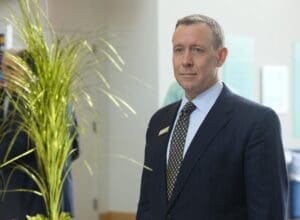This Is My Hartford is a series from the MetroHartford Alliance where we connect with local business
owners, community drivers, residents, and employees to find out how the Hartford Region has shaped
them throughout their career, and what they have done to shape our city and region.
By Nan Price, Content Manager, MetroHartford Alliance
 Next in our series, John Bourdeaux, Vice President of Advancement at the Connecticut Science Center.
Next in our series, John Bourdeaux, Vice President of Advancement at the Connecticut Science Center.
WHY HARTFORD?
JOHN BOURDEAUX: We moved to Hartford eight years ago. Before that, we lived in Northwest
Connecticut, way out in the middle of nowhere. We wanted to move somewhere more urban, so we
looked at a lot of different places—Atlanta, where I’m from; Buffalo, where my wife is from; Chicago,
where we met; and we looked at Hartford.
When we put it all side by side, Hartford had absolutely everything we were looking for. It surprised us.
But we realized if we wanted a beautiful home, access to great jobs and nearby cultural institutions, and
a place that would support us in how we wanted to raise our family, Hartford had everything we
wanted.
HOW HAVE YOU BECOME A PART OF HARTFORD?
JOHN: I’ve become a part of Hartford by working in the nonprofit community in particular. I try to bring more people into relationships with all the phenomenal cultural institutions and nonprofits and people each other in Hartford. I’m a connector and I love bringing people with similar interests
together.
One of the things I like about Hartford is that people are increasingly enthusiastic about weaving their
threads together. I like being a part of the weaving process and helping people recognize their common
interests. By doing that, I’ve learned so much about so many different things going on around Hartford.
HOW HAS HARTFORD BECOME A PART OF YOU?
JOHN: We live in the West End of Hartford. We work in Hartford. We volunteer in Hartford. We go to
church in Hartford. We’re proud to say we’re from Hartford and we’re shameless Hartford boosters.
I love the fact that we came to Hartford as people who were not from here and were invited to
participate in loads of things—the Connecticut Science Center, the Hartford Symphony, Night Fall, the
Hartford Stage, Asylum Hill Congregational Church. If you have even a modicum of willingness, you can
be a part of Hartford in a way that will be really rewarding. And it’s been really rewarding for me.
WHAT MAKES HARTFORD UNIQUELY HARTFORD?
JOHN: What makes Hartford unique is that there’s this beautiful history of where the city has been and
there’s a tremendous amount of enthusiasm and catalytic activity happening right now. And, there are
so many ways to key into that. I don’t know if that makes Hartford unique, but it does make it a unique moment for Hartford. Organizations here are either a part of Hartford’s history or mining that history to
create our future in a way that I find both exciting and optimistic.
HOW DO WE TELL THE STORY OF HARTFORD?
JOHN: Hartford has a history and a narrative that’s still being written. Not surprisingly, a lot of Hartford
naysayers are not engaged. Or they’re speaking about things from a statistical or fear-based mindset as
opposed to a relationship-building and optimistic mindset. I think optimism is a choice and I feel badly
for those who don’t choose it.
So, what can we do to change the narrative? We are telling our stories about the successes we have
here. I will not personally participate in a talking down about Hartford and I will call people out on it. I’ll
engage them in a conversation about it and ask: What don’t you like about Hartford and what are you
willing to do about it?
WHERE DO YOU SEE HARTFORD IN THE NEXT FEW YEARS?
JOHN: I see a city that is ever more vibrant. I see a city that is able to answer a lot of people’s needs
around more dense living, because I think living closely together and being connected—not just
connecting, but being actually connected—is an important part of our story and a part of our future.
So, my hope for the future of Hartford is, when people sit down to talk about the story of Hartford, that
they’re talking about the work we’re doing here in the city, not just around business and industry, but
around community building. Business and industry are important, but business and industry require
communities and contexts to thrive. I think that’s really important and I hope Hartford continues on the
path we’re on.
